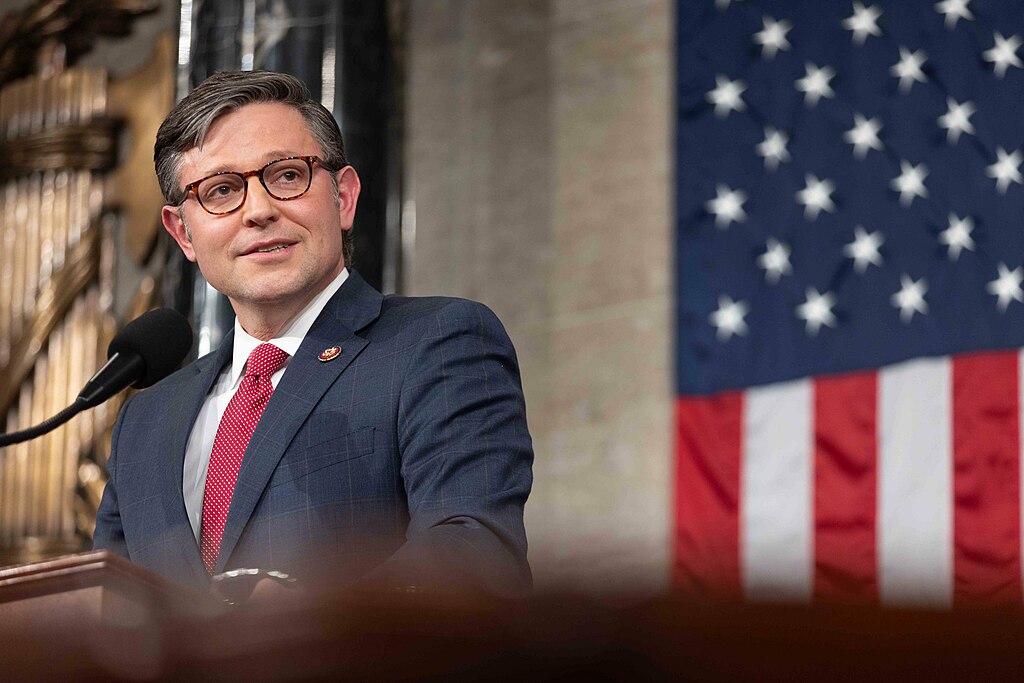House Speaker Mike Johnson announced new restroom regulations at the Capitol on Monday, confirming that biological men will be prohibited from using women’s restrooms within the government facility. The move, which aligns with Johnson’s previous stances on gender-related policies, has already sparked heated discourse across political and social platforms.
The policy, effective immediately, was implemented in response to what Johnson described as concerns over privacy and safety. According to insiders, the rule will be enforced throughout Capitol grounds, including offices, public areas, and staff facilities. Violators could face disciplinary action, although the specifics of enforcement remain unclear.
Johnson’s decision comes as debates over gender identity continue to dominate legislative conversations nationwide. The ruling has drawn praise from conservative lawmakers and constituents who believe it safeguards traditional norms, while LGBTQ+ advocates and progressive leaders have condemned the move as discriminatory and unnecessary.
A Polarizing Policy
For proponents of the policy, the prohibition is seen as a step toward protecting women’s privacy. Representative Lauren Boebert (R-Colo.) supported the measure, citing constituent concerns about women’s rights and comfort in public spaces. “Women deserve privacy in restrooms, especially in one of the most high-profile buildings in the country,” she said in a statement.
Opposition to the decision, however, has been swift and vocal. Democratic lawmakers and LGBTQ+ organizations have called the policy an attack on transgender individuals, accusing Johnson of using his authority to advance a regressive social agenda. “This is nothing more than an attempt to marginalize transgender Americans and create unnecessary division,” argued Representative Pramila Jayapal (D-Wash.), co-chair of the Congressional Progressive Caucus.
Legal Ramifications
While Johnson’s directive is limited to the Capitol, critics warn it could set a precedent for similar policies in federal buildings nationwide. Legal experts have also raised questions about potential violations of Title VII of the Civil Rights Act and other anti-discrimination laws. ACLU representatives hinted at possible legal challenges, emphasizing the potential impacts on transgender employees and visitors to the Capitol.
“This policy undermines the rights of transgender individuals and could open the door to lawsuits,” said Sarah Lipton-Lubet, executive director of the LGBTQ+ advocacy group Take on Wall Street.
Public Reaction
The public response has been equally divided. Social media platforms exploded with hashtags both in support of and against the measure, with trending topics such as #ProtectPrivacy and #TransRightsUnderAttack. Advocacy groups on both sides have organized rallies, including one planned for next week outside the Capitol.
Many Americans view this decision as emblematic of broader cultural battles. A recent poll indicated that opinions on such restroom policies remain sharply divided, with 46% supporting gender-specific restrooms and 44% advocating for inclusive facilities.
Looking Ahead
Whether the new policy withstands legal scrutiny or public backlash remains to be seen. For now, the Capitol’s restrooms have become an unlikely battleground in the nation’s ongoing debates over gender identity and civil rights.



 Supreme Court Backs GOP Lawmaker in New York Redistricting Fight Ahead of Midterms
Supreme Court Backs GOP Lawmaker in New York Redistricting Fight Ahead of Midterms  Suspected Iranian Drone Hits CIA Station at U.S. Embassy in Riyadh Amid Rising Middle East Tensions
Suspected Iranian Drone Hits CIA Station at U.S. Embassy in Riyadh Amid Rising Middle East Tensions  Trump’s Iran Strikes Spark War Powers Clash in Congress
Trump’s Iran Strikes Spark War Powers Clash in Congress  Michael Whatley Wins North Carolina GOP Senate Primary, Setting Up High-Stakes Battle With Roy Cooper
Michael Whatley Wins North Carolina GOP Senate Primary, Setting Up High-Stakes Battle With Roy Cooper  Trump Says U.S.-UK Relationship Has Deteriorated After Starmer Hesitates on Iran Strikes
Trump Says U.S.-UK Relationship Has Deteriorated After Starmer Hesitates on Iran Strikes  Why did Iran bomb Dubai? A Middle East expert explains the regional alliances at play
Why did Iran bomb Dubai? A Middle East expert explains the regional alliances at play  Does international law still matter? The strike on the girls’ school in Iran shows why we need it
Does international law still matter? The strike on the girls’ school in Iran shows why we need it  Trump Defends Extended U.S.-Israel Military Campaign Against Iran
Trump Defends Extended U.S.-Israel Military Campaign Against Iran  Trump to Attend White House Correspondents’ Dinner 2026, Ending Long Boycott
Trump to Attend White House Correspondents’ Dinner 2026, Ending Long Boycott  AI is already creeping into election campaigns. NZ’s rules aren’t ready
AI is already creeping into election campaigns. NZ’s rules aren’t ready  Santander’s $12.2B Webster Financial Deal Faces Uncertainty Amid U.S.–Spain Trade Tensions
Santander’s $12.2B Webster Financial Deal Faces Uncertainty Amid U.S.–Spain Trade Tensions  U.S. Middle East Strikes Raise Indo-Pacific Security Concerns for Japan, South Korea, and Taiwan
U.S. Middle East Strikes Raise Indo-Pacific Security Concerns for Japan, South Korea, and Taiwan  Trump Offers U.S. Insurance and Naval Escort for Tankers as Strait of Hormuz Crisis Disrupts Global Oil Trade
Trump Offers U.S. Insurance and Naval Escort for Tankers as Strait of Hormuz Crisis Disrupts Global Oil Trade  Trump and Merz Meet at White House Amid Iran Strikes and Trade Tensions
Trump and Merz Meet at White House Amid Iran Strikes and Trade Tensions  Middle East Air War Triggers Massive Flight Cancellations and Global Airline Disruptions
Middle East Air War Triggers Massive Flight Cancellations and Global Airline Disruptions  Nepal General Election 2026: Youth Protests, Political Change, and a New Generation of Voters
Nepal General Election 2026: Youth Protests, Political Change, and a New Generation of Voters  U.S. Interior Department Responds to Leak of Trump Administration Plans to Revise National Park History
U.S. Interior Department Responds to Leak of Trump Administration Plans to Revise National Park History 




























